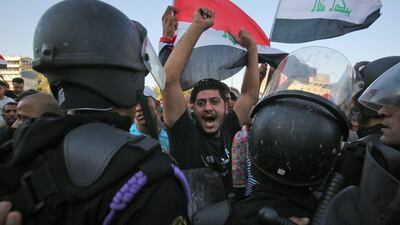Political parties that emerged from Iraq’s October 2019 uprising are boycotting the elections to work on strategy and build an opposition, analysts and campaigners said on Wednesday.
In late 2019, millions of Iraqis took to the streets in anger at a political system that failed to create employment and provide a good standard of public services. Their demands were met by rubber bullets, tear gas, snipers, and the deaths of nearly 700 people. Thousands were injured.
“Boycotting the elections is a form of protest and it complements the October protests because of the government approach in dealing with unarmed protesters. It’s a political stance,” said Inas Jabbar, a Baghdad activist, during an online talk about Iraq by the London School of Economics (LSE).
“The alternative is to form an opposition front that is patriotic and monitors the performance of the government. This is done so they will not be part of the government."
Iraq is to hold parliamentary elections on October 10. The ballot is nearly six months early and has been called by Prime Minister Mustafa Al Kadhimi after he took office in May 2020.
The protest movement called for the resignation of his predecessor, Adel Abdul Mahdi. Protesters also demanded the adoption of an electoral law that allowed a number of independent civil rights groups and political parties run for parliament. They are seen as opposition to the political class that has dominated Iraq's scene since 2003.
But many parties have campaigned to boycott the elections in response to a rise in the number of murders and arrests of activists and journalists. The parties that have emerged out of the protests are weak as they do not have a developed opposition agenda, said Taif Al Khudary, research assistant for LSE’s Middle East Centre.
“It seems that the strategy of staying outside the elections and trying to build a political agenda and allegiances and trying to show that the kind of politics that they are doing is different to the politics of the establishment parties is at least worth considering as a strategy,” Ms Al Khudary said.
Popular base
She said organising within Iraq made them stand out.
“They have a popular base to some extent that really stands in contrast to the kind of established parties and politicians who impose the politics of Muhasasa from outside Iraq on the Iraqi people,” she said.
The state’s system, known as the Muhasasa, ensures senior positions in government are divided among ethno-sectarian groups. It has linked the state’s economy to political blocs that advocate for some kind of sectarian entity.
With time and opportunity to build a strong opposition, the parties that emerged from the protest movement may have a chance, Ms Al Khudary said.


